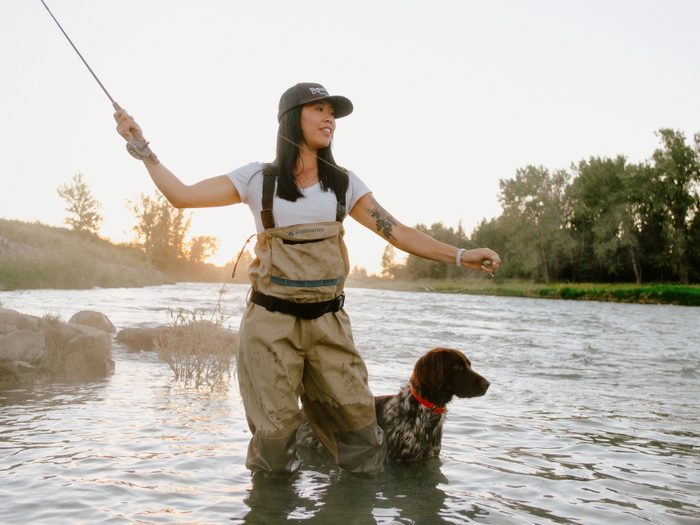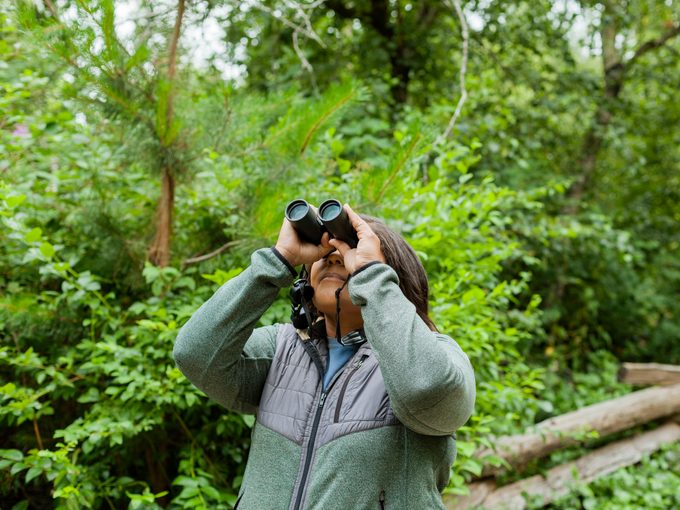The Life Changing Power of Hobbies

What you do with your free time is more important than you might think. Here’s why having a hobby is good for your health.
Ruth Lee has lived in Calgary for 26 years, since she was three years old. But it wasn’t until she met her boyfriend in 2014 that she learned she inhabits a fly-fishing utopia, that the Bow River that rushes through Alberta’s largest city is a bucket-list topper for anglers around the world. Shortly after they started dating, Lee’s boyfriend, an avid fly-fisher, took her out to a quiet spot on the Bow, just south of the city. Standing in the flowing water in just her flip-flops and shorts, she learned to cast and, to her surprise, caught her first fish: a 12-inch-long rainbow trout. She’s been hooked on the hobby ever since.
“I’m first-generation Korean-Canadian and, growing up, my parents were always working,” says the graphic designer. “I always wanted that sort of adventure, but I didn’t know how to go about it.” While she has her boyfriend as a personal instructor and guide, in 2018, Lee joined the Calgary Women Fly Fishers Club, connecting with fisherwomen of all ages and abilities at weekly meetings, at fly-tying workshops and on day trips. But whether she’s with her partner or the club, she keeps on casting because of what it does for her mind. “From nine to five, I’m on a screen,” she says. “Fly-fishing is a way to put my phone away, disconnect and be present. It’s also brought me a lot of gratitude for where I live.”
(Related: This Is the Perfect Pandemic Sport to Get Into Now)
With all of the demands on women’s time, from careers to caregiving, hobbies might seem low on the priority list. But even though we’re juggling families, relationships, meetings and appointments, it’s essential for our health that we add in activities that bring joy and pleasure. “Leisure is the space in our lives that is most free,” says Colleen Deyell Hood, a psychotherapist and professor of recreation and leisure studies at Brock University in St. Catharines, Ont., who has been active in the field of therapeutic recreation for more than 30 years. “Everywhere else we’re constrained by job expectations or roles, but in leisure, we can purposefully choose engagement activities that support our health.” And getting this kind of fulfillment outside work and family life, where so much of our value is placed (or, contrarily, where we don’t feel we get to use our strengths), is essential for self-esteem and satisfaction, says Deyell Hood.
Of course, there are the physical benefits that come along with hobbies such as running, yoga and salsa dancing, and social benefits tied to hobbies like playing on a volleyball team and singing in a choir. But it’s the mental health benefits provided by all hobbies, no matter what they look like, that make them so beneficial to our lives—especially when something destabilizing, like a pandemic, comes along.
(Related: How Learning an Instrument as an Adult Helped Me With Brain Fog and Anxiety)
In the past 18 months, as COVID-19 restrictions put further constraints on us, hobbies have become even more vital for our mental health, to maintain routine, provide richness and enjoyment, and manage stress and anxiety. And as floor hockey leagues and in-person choir practices were halted—and after all the loaves of sourdough had been baked—many people opted for solitary outdoor activities, such as fly-fishing, birdwatching and stargazing, all of which have surged in popularity since March 2020.
“What’s arisen from the pandemic is a return to some of these simpler, low-equipment, low-structure kinds of activities,” says Deyell Hood. “And, given how structured our lives are, I think it’s a good thing! Getting your binoculars and going birdwatching or hiking with your dog are wonderful, simple, contemplative activities that can have tremendous benefit.” Engaging in a meditative pastime can help with mindfulness. Hobbies like birdwatching require a mindful awareness of one’s surroundings and an immersion in the moment as worries are cast aside. As well, there’s the potential to enter what psychologists call “the flow state”: complete immersion and concentration in an activity, which results in a deep sense of pleasure and fulfillment that makes time pass unnoticed. It’s hard to think of a more welcome respite after months of isolation and work-from-home conditions that have left us with higher than ever levels of burnout, irritation, physical discomfort and stress.
Recent research has also linked engaging in regular hobbies with lower instances of depression—the Centre for Addiction and Mental Health reported, in an ongoing survey tracking pandemic mental health, that one in five Canadians were continuing to deal with mental distress as of March of this year. In a longitudinal study published in the Journal of Psychotherapy and Psychosomatics last year, researchers looked at 8,780 adults and found that those who took up a hobby had lower levels of depressive symptoms, as well as a 32 percent less chance of developing depression.
Ciara McCabe, a professor of neuroscience at the University of Reading, studies the brain’s reward system in her lab, the Neuroimaging of Reward Group, and is interested in how it might be used to treat depression—particularly one of the most common symptoms, anhedonia, or the inability to experience joy or pleasure. Since participating in hobbies that bring joy triggers the reward system, releasing feel-good neurotransmitters like dopamine (which motivate us to continue to engage in them), there’s reason to think hobbies could be effective treatments for depression, she says. What’s more, they may even be preventive: “Hobbies could be potentially useful for preventing low moods or depression-like symptoms in anybody,” says McCabe. “If you have a hobby, it’s probably distracting, taking your mind off the bills or your difficult relationships. Maybe your hobby is creative, so you feel a sense of achievement. It gives you something to talk about and increases your social connections. All of these things are in and of themselves important for your mental health. But when you combine them [with the reward system], they probably have a kind of booster effect.”
(Related: This Is the Most Relaxing Hobby You Can Take Up)

Being a long-time birdwatcher has undoubtedly had a positive effect on Melissa Hafting’s mental health. She’s been at it since age five, when her dad would take her to the George C. Reifel Migratory Bird Sanctuary in Delta, B.C., and the pair would tick off sightings in her pocket-sized Golden Field Guide. “As I got older, it became a passion, way surpassing what my dad knew about birds.” Hafting, who is a biologist in Richmond, B.C., now runs the B.C. Rare Bird Alert website (which she fields texts, calls and emails for 24-7). She also founded a program for young birders and continuously works to make the birding community more inclusive and diverse.
Hafting birds every day. During the week, she frequents two parks close to her house, usually taking one- to two-hour walks during which she spots warblers and flycatchers. On the weekends, she heads to places like Boundary Bay to look at shorebirds or Grant Narrows Regional Park to see catbirds. “I love how relaxing it is,” she says. “It lifts you up, it gets you away from thinking, it shifts your mind away from all the busyness in life. It immediately calms my mood.” Birding has also supported her in tough times: “When my grandmother died, birding helped me get through it and keep going. And that cemented how important this hobby is to me.” The mental benefits Hafting has experienced from it throughout her life are why she thinks birdwatching has seen such an uptick throughout the pandemic. “A lot of people have been feeling stressed and isolated, and when they birdwatch, they can go to a place that’s more peaceful for them.”
(Related: The Health Benefits of Open-Water Swimming)
No matter your hobby (or hobbies), the key is that you’re actively participating in it, whether physically, like in gardening or cycling, or mentally, such as in learning a new language. “The more engaged you are, the greater the benefit for positive emotion, brain stimulation and overall well-being,” says Deyell Hood. Balance is also important: It’s great when you participate in a hobby, or mix of hobbies, that offer physical, social and cognitive activity. A 2020 study published in the Journals of Gerontology: Psychological Sciences looked at the variety and consistency of activities in participants ages 34 to 84 over a 10-year span and found that those whose activity diversity increased had higher levels of cognitive function, including memory, reasoning, processing speed and attention span. And finally, make sure to find something that is inherently joyful and pleasurable for you, which often will tap into your strengths. “Leisure allows you to say, ‘I’m drawn to this activity, I have some talent in it and it’s going feel so good to develop my skills in that,’” says Deyell Hood.
For Lee, fly-fishing checks all the boxes. She acknowledges it’s perceived as an old man hobby, but she challenges that. “You’re not just sitting and waiting for the fly to go down,” she says. “You’re hiking to some cool spots, often for a couple hours; you’re rowing a boat, being attentive to the river, connecting with nature and having some good conversations. If you catch a fish, that’s really just a bonus.”
Next, this is how the pandemic opened up conversations about Parkinson’s for one family.




